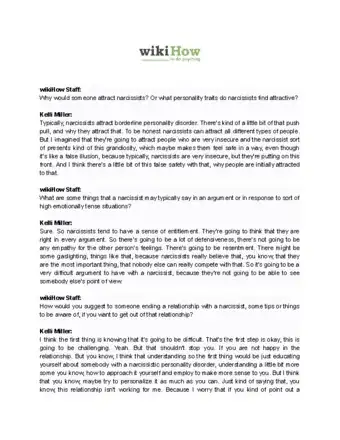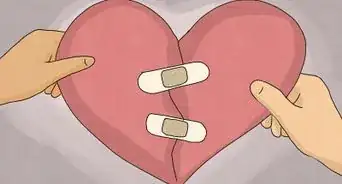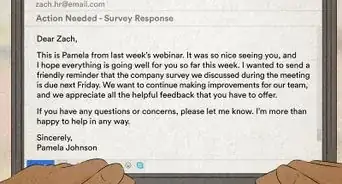This article was co-authored by Kelli Miller, LCSW, MSW. Kelli Miller is a Psychotherapist based in Los Angeles, California. Kelli specializes in individual and couples therapy focusing on relationships, depression, anxiety, sexuality, communication, parenting, and more. Kelli also facilitates groups for those struggling with alcohol and drug addiction as well as anger management groups. She is the author of “Professor Kelli’s Guide to Finding a Husband” and the award-winning and best-selling book “Thriving with ADHD”. Kelli co-hosted an advice show on LA Talk Radio and is a relationship expert for The Examiner. She received her MSW (Masters of Social Work) from the University of Pennsylvania and a BA in Sociology/Health from the University of Florida.
wikiHow marks an article as reader-approved once it receives enough positive feedback. In this case, 100% of readers who voted found the article helpful, earning it our reader-approved status.
This article has been viewed 902,701 times.
Do you always seem to cross paths with people who are stuck on themselves, intolerant of people different from them, rude or downright arrogant? These people can be a great source of potential pain, and this article is here to help you sort the arrogant from the not-so-arrogant.
Steps
-
1Pay attention to their conversations. Don't eavesdrop, but when they're talking to you or to those around you, listen to them. Is it always about them? Do they get mad or irritated if the center of attention moves to someone else? These are good signs of arrogance.
- Arrogance and smugness are often a reflection of limited life experience, and feeling concerned that those with greater life experience "have got something over them." Rather than seeking to find out more through questions and learning (actions viewed by them as showing vulnerability), arrogant people tend to generalize from their limited, narrow life experiences and try to impose their small worldview on others.
- Jealousy of your achievements or seeming lifestyle can cause another person to feel smug or arrogant about something they think they do better than you or own/have that you don't.
- Arrogant people have an extremely strong need to look good. When you make them look bad - even if it is the slightest offense - they will usually be very mad at you. This happens when you question (or at least seem to question) their appearance, intelligence, athletic abilities, or anything else relating to their self-image.
-
2Challenge their worldview. Don't be aggressive––just skeptical and curious. If they get upset, gauge their anger. If it's minimal, they may be simply having a bad day. But if they're enraged, then they may see you as questioning their "perfect little world." And having one of those is usually indicative of arrogance.
- At some point or another, most people realize that the world doesn't revolve around them. Arrogant people counteract this by creating an atmosphere that revolves around them, and get angry if they're reminded of the real world.
- Ambiguity frightens arrogant people because it suggests imperfection, change, and lack of certainty (realities we all must contend with as best we can). As such, instead of accepting that the world behaves randomly and at times totally averse to one's preferences, the arrogant person seeks to control everything and everyone, which of course, is an impossible mission.
- Reality hurts when it intrudes; as such, an arrogant person is less likely than other people to self-reflect or analyze, thereby not seeing their own imperfections. They may also give themselves undue credit for positive achievements instead of acknowledging the input of others or of circumstances.
Advertisement -
3Learn the quality of their friendships. Don't be nosy or gossipy, but if they are happy with someone one day and hateful with them the next, that's a sign of them having a lot of fair-weather friends. That's a sign of arrogance since it is very hard to be a truly good friend to someone who's stuck on themselves. Prideful people have a strong need to look good, and being self-sufficient is an effective way to do that. Since being a good friend to someone usually, means helping them, they often can't stand the thought of a good friendship.
- Ironically, arrogant people often can't understand why they don't have any reliable and supportive friends.
-
4See how they treat others who are unlike in some ways. In other words, how do they treat those with different beliefs, cultural backgrounds and ways of seeing the world? If it's inherently negative, then they're either over-zealous, ignorant of other people, or what to avoid those that contradict their fantasy land that caters to them and them only. Determine this based on their general personality and the people they're interacting with.
- Many times, prideful people have a serious "my-way's-the-only-way" attitude. This is simply a protective mechanism for their false image or their fantasy land.
-
5Observe how their personality is like. Take note of how they act, talk, and use their social status. Do they have a general sense of "coolness"? Are they a chatterbox? Do they act like they own the place, or act like the "big dog"? Are they very keen on their self-image?
- Many arrogant people have a false charm that no one seems to see through. But the arrogant person is usually more than happy to show their cruel side to those that they don't like.
- When they are cruel, their friends will usually ignore it or not do anything to stop it since they're afraid that they'll be treated badly by their "friend."
-
6Mention people you know that they don't like. This isn't meant to begin a conflict, but to gauge their rivalries, annoyances, and enmities. If their condemnation seems to be reasonable, they probably aren't hubristic. If it's harsh, they are.
- For the most part, arrogant people see people that they don't like as threats to their perfect little world. The more they hate someone, the more dangerous that person is to their fantasy land. And in turn, the bigger the threat, the harsher the criticism.
-
7Ask around to see what they've been saying about you. If they have been saying bad things about you, they may simply not like you. If they're nice to your face, but talk bad about you behind your back like it's their favorite hobby, then they probably have a problem with pride.
- Arrogant people often subconsciously know that they don't have any good friends. They compensate for this by creating the "impression" that they have a lot of friends - they have a "quantity, not quality" mentality. Then they simply insult their trophy friends when they aren't looking.
-
8Be compassionate. Don't be judgmental of arrogant people or you risk having as negative an outlook as they do. Arrogant people are often trying to hide certain vulnerabilities and fears. Most of the time, the need for a strong and unquestionable self-image comes out of deeply rooted pain. Obviously, you also don't need to be taken in by their claims to be superior to you. Stay principled and detached. But you can reach out and see the genuine good in them and praise what is real, rather than perceived or forced, talent. Sometimes, having someone push through the brusqueness can free the arrogant person to be much truer to themselves, allowing them to stop shielding themselves so fiercely.
- An enormous amount of vulnerability tends to hide behind arrogance. This leads to overcompensating so that the vulnerability is deeply suppressed. For example, if an arrogant person grew up poor but later becomes rich, he or she may be snobbish about everything they can now afford because they are covering up the fear of poverty from the past...
Expert Q&A
-
QuestionHow does someone know when to let go of a friendship or relationship?
 Guy ReichardGuy Reichard is an Executive Life Coach and the Founder of HeartRich Coaching & Training, a professional life coaching and inner leadership training provider based in Toronto, Ontario, Canada. He works with people to create more meaning, purpose, well-being, and fulfillment in their lives. Guy has over 10 years of personal growth coaching and resilience training experience, helping clients enhance and transform their inner worlds, so they can be a more positive and powerful influence on those they love and lead. He is an Adler Certified Professional Coach (ACPC), and is accredited by the International Coach Federation. He earned a BA in Psychology from York University in 1997 and a Master of Business Administration (MBA) from York University in 2000.
Guy ReichardGuy Reichard is an Executive Life Coach and the Founder of HeartRich Coaching & Training, a professional life coaching and inner leadership training provider based in Toronto, Ontario, Canada. He works with people to create more meaning, purpose, well-being, and fulfillment in their lives. Guy has over 10 years of personal growth coaching and resilience training experience, helping clients enhance and transform their inner worlds, so they can be a more positive and powerful influence on those they love and lead. He is an Adler Certified Professional Coach (ACPC), and is accredited by the International Coach Federation. He earned a BA in Psychology from York University in 1997 and a Master of Business Administration (MBA) from York University in 2000.
Executive Life Coach When the relationship is toxic or abusive in any way, and you’ve taken courageous, loving steps to address the issues and ask for better treatment, and the friend has no desire to change, it’s time to let go. Some people let go too quickly and easily. I'm not saying anyone should stay in a toxic or abusive relationship, but sometimes there’s simply a one-sided sense of unfairness or inequality. This situation is not necessarily toxic or abusive, but the one person is afraid of confrontation and conflict, and so they simply stonewall or ghost the other person. That’s not fair either. The key is that you’ve tried to improve the situation, and you’ve tried to grow and do your best, and you find no partner to improve and grow with you. Then it’s a sign to let go.
When the relationship is toxic or abusive in any way, and you’ve taken courageous, loving steps to address the issues and ask for better treatment, and the friend has no desire to change, it’s time to let go. Some people let go too quickly and easily. I'm not saying anyone should stay in a toxic or abusive relationship, but sometimes there’s simply a one-sided sense of unfairness or inequality. This situation is not necessarily toxic or abusive, but the one person is afraid of confrontation and conflict, and so they simply stonewall or ghost the other person. That’s not fair either. The key is that you’ve tried to improve the situation, and you’ve tried to grow and do your best, and you find no partner to improve and grow with you. Then it’s a sign to let go. -
QuestionMy fiance asked me to move in with him and now he always says hurtful things to me. Things like "Don't act like this is your house, you are a guest here." He wants to me to ask permission for everything. What do I do?
 Community AnswerIn all honesty, your fiance is a jerk and you don't deserve to be treated like that. In the end, your self-respect matters and regardless of who the hatred comes from, you should care for yourself. If I were you, I would tell him his words are unacceptable. If you don't get an apology, break it off with him. Respect should be the most important aspect of a marriage, so it is not a good sign if he is already exhibiting a lack of it while you are still engaged.
Community AnswerIn all honesty, your fiance is a jerk and you don't deserve to be treated like that. In the end, your self-respect matters and regardless of who the hatred comes from, you should care for yourself. If I were you, I would tell him his words are unacceptable. If you don't get an apology, break it off with him. Respect should be the most important aspect of a marriage, so it is not a good sign if he is already exhibiting a lack of it while you are still engaged. -
QuestionIs it good to be in a relationship with a guy who thinks it is all about him or thinks it is all about looking good?
 Community AnswerNo, that's not a healthy relationship to be in. Relationships should not be so superficial or so one-sided. Best to put and end to this and hopefully eventually find a more caring person to be with.
Community AnswerNo, that's not a healthy relationship to be in. Relationships should not be so superficial or so one-sided. Best to put and end to this and hopefully eventually find a more caring person to be with.
Warnings
- Keep in mind that there may be a psychological difficulty that may come across as arrogance (seeming aloof or closed off or insecure with a false sense of self). In some cases, this could be bipolar disorder, borderline personality disorder or a social phobia. It could be many things like a history of abuse or illness or bullying. Some people don't realize that their behavior marginalizes them from others and stops them from making friends. Be aware that while it is easy to call anyone "arrogant" as a wholesale generalization of a person's character, take into account your own mood, their mood, environmental conditions and life circumstances. Sometimes what people do or say has nothing to do with you. Be careful when you assume they're acting in a certain way to specifically to upset or anger you. Be smarter than them.⧼thumbs_response⧽
- If they get in your face, leave or just ignore them and continue doing what you're doing. What makes them madder than anything is ignoring them, giving into them is giving them the satisfaction of knowing they have gotten to you. They are simply trying to inflate their ego, and insulting or arguing with them will inflate it a lot. Leaving will too, but not nearly as much, all they want is attention, because they are insecure.
- Depending on the situation, leaving might make them look stupid. They will hate you for this, but nobody wants to keep company with a total jerk!
⧼thumbs_response⧽ - Don't pay lip service to their perfect world. This will not only help you stay true to yourself, but may help them to see things differently.
- Don't actually attack their fantasy land. Instead, say something like "I don't agree with you on that" or "I have different opinions on this". They might get angry, but these chances aren't as high as they would be if you questioned their self-centered universe outright.
- Instead of saying "Maybe if you'd get over yourself, you'd see things for what they are", try saying "What makes you say that?" or "Why do you hold that opinion?" This forces the person to answer a very direct, factual question.
⧼thumbs_response⧽ - No matter how much you might want to say something nasty to them, don't! It will do no good anyway. Don't go into platitudes about how arrogance is wrong. Just give a quick answer and let them understand that you don't want them in your life, being assertive doesn't necessarily mean putting things into words; be on your look-out; be smarter than them.
- If they've backstabbed you, point this out. No one – not even the arrogant person's "best friends" – will appreciate that behaviour.
⧼thumbs_response⧽ - If you have to vent about an arrogant person, do so only to your best friends who won't tell anyone else. If your anger becomes common knowledge, it will start a conflict.
- There's a good chance that the prideful person won't understand why you don't like them. Just ignore their rude behaviour, and use a short and smart comeback if you must.
⧼thumbs_response⧽ - Ironically, if you do win the argument or fight, they'll start playing the 'Victim' card, and start appealing to their 'friends' to not only help them feel good, but also make you look bad.
- If the arrogant person is considered 'cool' by a lot of people, their use of the Victim card could make you an outcast. Act discreetly when confronting cool people with an ample entourage.
⧼thumbs_response⧽ - One of the symptoms of any antisocial personality disorder (such as psychopathy and sociopathy) is arrogance and disrespect for other people's rights. This is a dangerous aspect of arrogant people; if you have to live with a person like this, seek advice.
- This is why some arrogant people go on to become criminals.
⧼thumbs_response⧽
Expert Interview

Thanks for reading our article! If you'd like to learn more about recognizing a narcissist, check out our in-depth interview with Kelli Miller, LCSW, MSW.






































































Medical Disclaimer
The content of this article is not intended to be a substitute for professional medical advice, examination, diagnosis, or treatment. You should always contact your doctor or other qualified healthcare professional before starting, changing, or stopping any kind of health treatment.
Read More...